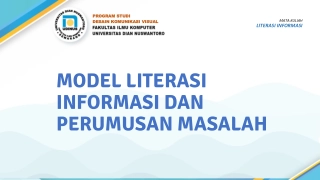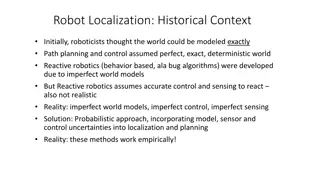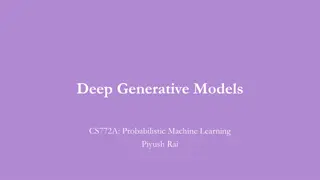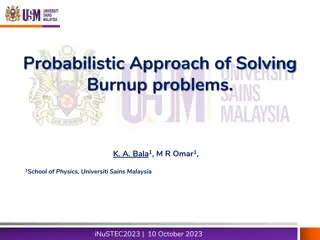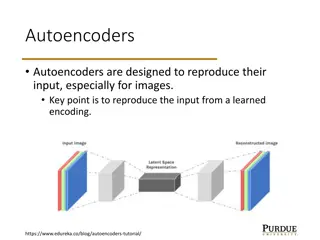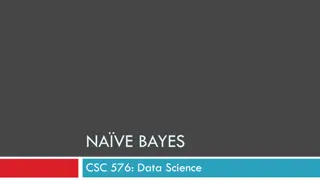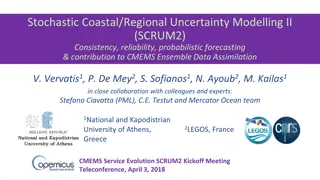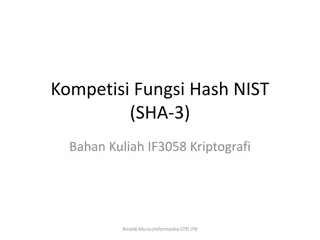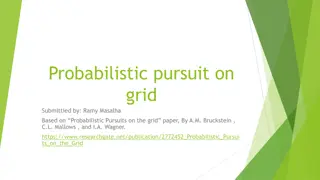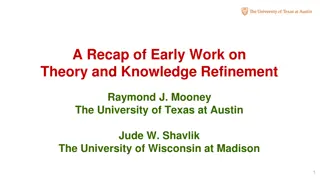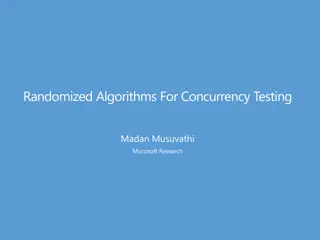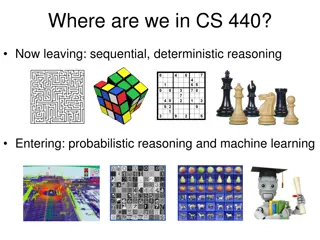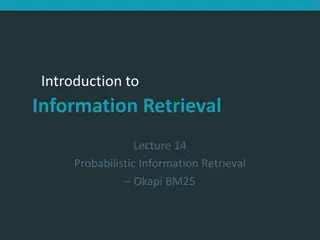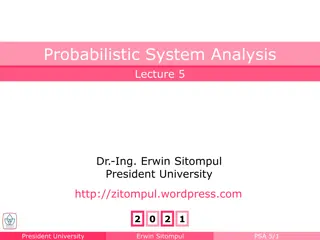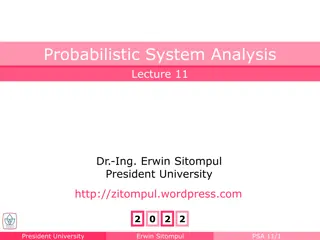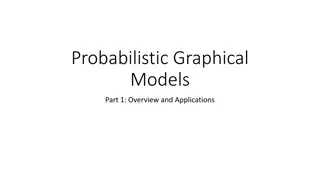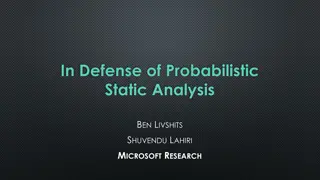Probabilistic Data Support: PL Techniques by Dan Grossman at University of Washington
Language design and implementation for managing uncertainty using programming language (PL) concepts and tools taught by Dan Grossman at the University of Washington. Emphasizing learning from statisticians and validating claims through UW's approximate computing work. Acknowledgements to co-authors including Adrian Sampson, Luis Ceze, Kathryn, and Todd.
Download Presentation

Please find below an Image/Link to download the presentation.
The content on the website is provided AS IS for your information and personal use only. It may not be sold, licensed, or shared on other websites without obtaining consent from the author.If you encounter any issues during the download, it is possible that the publisher has removed the file from their server.
You are allowed to download the files provided on this website for personal or commercial use, subject to the condition that they are used lawfully. All files are the property of their respective owners.
The content on the website is provided AS IS for your information and personal use only. It may not be sold, licensed, or shared on other websites without obtaining consent from the author.
E N D
Presentation Transcript
Safely Supporting Probabilistic Data: PL Techniques as Part of the Story Dan Grossman University of Washington
Executive summary Language design+implementation to help wrangle uncertainty PL concepts+tools are a huge help But also need to learn from statisticians Validate these claims with UW s approximate computing work Acknowledgments: 9 co-authors [papers at end] Especially Adrian Sampson, Luis Ceze Including Kathryn and Todd
Background (1/2): PL bread-and-butter Types for information flow Symbolic execution z: z = x; if(x!=0) z = x*y; ? : int<H> x; int<L> y; if(x) y = 7; == * 0 x x 0 y Function inlining/specialization int f(int x, int y){ return x*y; } f(0,a) 0 f(3,b) f(3,b) f(1,c)c Type inference let f = y. y+7 let z = f 9 let q = z && true
Background (2/2): Approximation Full bit-precision is unnecessary and wastes energy Allowing probabilistic [in]correctness can work! Let ALUs and memory produce garbage with low-nonzero probability But most code/programmers want nothing to do with that
EnerJ (and EnerC) a la 2011 Information flow is exactly the right high-level abstraction Type qualifier for @approx Explicit endorse as needed Convenient: Opt-in with precise default Overloaded operations and methods Strong guarantee: Approximate data has no effect on precise data except via endorse (classic non-interference theorem) @approx int x = 12; int y = 27; y = x*2; x = y*3; @approx int z = f(x); if(looks_okay(z)) int w = endorse(z);
EnerJ limitations Only best effort semantics for approximate computation Encapsulated all the probability, and then ignored it! No approximate control-flow (without endorse) Stronger limitation to ensure non-interference, no crashes, no extra non-termination,
Adding probabilities (2015) Address limitation #1 directly: Address limitation #1 directly: @approx<p> int: static guarantee that at run-time value will be correct with at least probability p Operator uses (e.g., +) also have correctness probability EnerJ s @approx is @approx<0.0> Precise is @approx<1.0> Natural subtyping: @approx<p> t <: @approx<q> t if p >= q [See also Mike s Rely and Chisel work (2014)]
Essential additions Type inference, part 1: Programmer states probabilities at key points (inputs, outputs) Automatic solver fills in the rest, and/or programmer can provide more annotations Type inference, part 2: Problem often under-constrained; goal is to save as much energy as possible within constraints We use Microsoft s Z3 solver with a custom objective function
Essential additions Type inference, part 1: Programmer states probabilities at key points (inputs, outputs) Automatic solver fills in the rest, and/or programmer can provide more annotations Type inference, part 2: Problem often under-constrained; goal is to save as much energy as possible within constraints We use Microsoft s Z3 solver with a custom objective function Method specialization Up to k approximation settings for each method Opt-in dynamic tracking for loop-carried dependencies
Still not much statistics Additions are all PL bread Additions are all PL bread- -and Uses only one trivial statistical fact: Uses only one trivial statistical fact: and- -butter butter @approx<p1> int x = ; @approx<p2> int y = ; x +<p3> y // @approx<p1*p2*p3> Result type is precise if x, y, (and addition) are independent Result type is sound regardless of [in]dependence Other panelists all make much better use of statistics, like in our Other panelists all make much better use of statistics, like in our probabilistic assertions probabilistic assertions work work
Probabilistic assertions (2014) Much richer setting: Much richer setting: Inputs/values can have arbitrary distributions, not just Inputs/values can have arbitrary distributions, not just Bernouilli Dependence tracked via symbolic execution, even through if Dependence tracked via symbolic execution, even through if- -statements and some loops and some loops Evaluate arbitrary probabilistic assertions: Evaluate arbitrary probabilistic assertions: passert(e,p,c) Key insight: Data-structure produced by symbolic execution is an expression DAG and a Bayesian network So apply compiler and statistical optimizations to it Followed by hypothesis testing Bernouilli failure statements failure
The limitation EnerJ and follow-on work gave static guarantees regardless of input Probabilistic assertions either revalidates for each input (testing) or needs probabilistic assumptions (distributions) of inputs Need more research on: Bridging this gap Supporting unbounded loops by soundly trimming low- probability paths
The big context Early days Excited by the panel s work, but many open questions Technical questions: (loops, modularity, scale, ) Tools questions, also with some preliminary work Debugging, profiling, monitoring Error messages Is adding statistical properties to modern language design The True Way Forward or a local optimum to avoid?
To learn more EnerJ EnerJ: Approximate Data Types for Safe and General Low : Approximate Data Types for Safe and General Low- -Power Computation. Computation. Adrian Sampson, Werner Dietl, Emily Fortuna, Danushen Gnanapragasam, Luis Ceze, Dan Grossman. PLDI2011 Power Expressing and Verifying Probabilistic Expressing and Verifying Probabilistic Assertions Panchekha, Todd Mytkowicz, Kathryn S. McKinley, Dan Grossman, Luis Ceze. PLDI2014 Assertions. Adrian Sampson, Pavel Probability Type Inference for Flexible Approximate Probability Type Inference for Flexible Approximate Programming. Boston, Adrian Sampson, Dan Grossman, Luis Ceze. OOPSLA 2015 Programming. Brett


